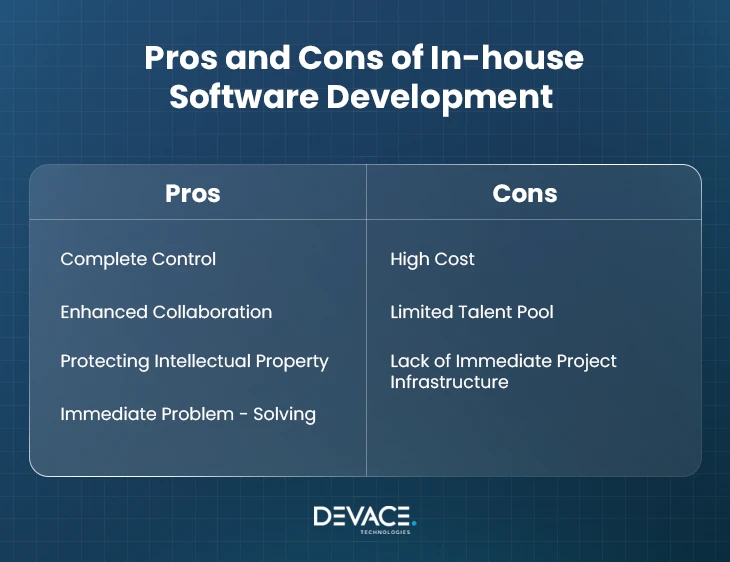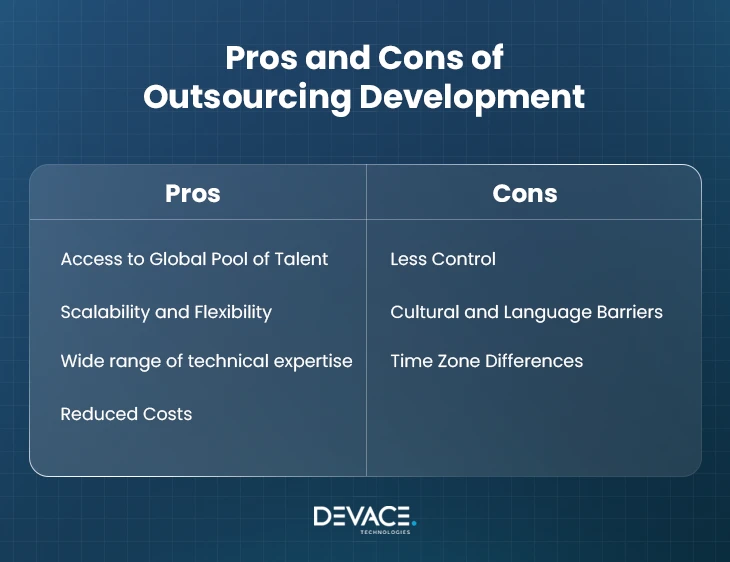In house vs outsourcing software development are the two business models for scaling the team and hiring professionals to work on your project. However, the preferences for both differ according to the needs and requirements of a project and the company’s goals.
With the growing number of developers across the globe, outsourcing software development has become quite easy. Here is a quick piece of information for you about the European countries with the highest number of developers:

This blog focuses on the difference between in-house teams and outsourcing software development to help you analyze when to choose one.
What is In-House Software Development?
In-house software development refers to hiring a team and professional resources within the office to utilize them for various projects. It does not work on the involvement of third parties and all the projects are assigned to the in-house departments.
The in-house resources go through a probation period and after completing it they are called the permanent employees of the company. Many organizations offer permanent employees benefits such as medical insurance, retirement plans, etc., with a fixed salary.
Calculating all sums up to a large amount of expenses which can be extremely costly, especially for startups and SMBs.
Pros and Cons of In-house Software Development
If this topic lives in your head rent-free, then it is better to know the pros and cons of in-house development so that you know what you want for your business.

Pros Of In-house Development
The pros of in-house development include direct supervision of the team, having more control, immediate problem-solving, and enhanced protection of Intellectual Property (IP). Below is a brief overview of each point.
Complete Control
When you work with the in-house teams, you get more control over the team by directly working with them. You can supervise them directly and communicate all the important points to them easily. This saves time in solving the issues and implementing the feedback seamlessly.
Enhanced Collaboration
One of the most important purposes and advantages of in-house software development is increasing collaboration among the team. When employees sit together, they would be better able to communicate with other departments. For example, when in-house design and development teams are present in the office, there would be fewer delays in implementation, deployment, and working on feedback.
Protecting Intellectual Property
Intellectual property is the most important asset of any organization. It serves as the recognition of the company’s products, services, etc. Therefore, it must be protected at any cost. It does not mean that IP is not secured when outsourcing. However, security gets enhanced when all stages of development are given to the in-house teams.
Immediate Problem-Solving
Imagine waiting 10+ hours to get a problem solved just because of the time zone differences. Frustrating, right?
Having an on-site team resolves the issues in delay and you can consult with the required person right away. You can have more control over your infrastructure and technology stack when troubleshooting technical problems. Managers can timely communicate with their teams and get issues resolved as quickly as possible.
Cons of In-house Development
It is no doubt that in-house software development comes with a lot of advantages. But there are downsides to it too. The disadvantages of insourcing are time, cost, and effort towards recruitment and onboarding, increased costs, turnover, and talent retention. Below is a brief overview of each point.
High Cost
When you hire an in-house team, the overall costs increase from recruitment to equipment and other expenses. However, when you outsource your project to offshore companies, the costs are reduced drastically. In-house teams lead to increased budgets due to the continuously increasing expenses for the employees.
Limited Talent Pool
When you limit yourself to a specific region with the conditions that they work in your office premises, it limits your organization to access limited people. This increases gaps in finding the right talent, and you might miss out on top candidates for your project.
Lack Of Immediate Project Infrastructure
Setting up an in-house software development team can result in concerns like resource allocation, skill set gaps, and scalability. An organization needs to focus on core business tasks which can be affected by continuous involvement in fulfilling the recruiting tasks.
When to consider In-House Development?
Many SMBs and startups consider in-house development as they require their team to work closely with managerial roles and understand the vision. Having your in-house team is most valuable when you require highly customized solutions that might also include controlling the regulatory requirements so that there is a proper workflow.
You can also do in-house development when there is a strategic need for providing services and acting robustly, ensuring security, integration with existing systems, and long-term cost efficiency. However, you must understand the significance of investments in infrastructure, skill development, and ongoing maintenance required to support in-house development efforts effectively.
What is Outsourcing Development?
Outsourcing development refers to hiring candidates remotely or from third-party services that offer staff augmentation services. When you outsource software development to a company, you hire specialized developers or dedicated teams to work on your project. They are not your permanent employees, and you only pay for the work you get done.
Pros and Cons of Outsourcing Development
Outsourcing development is one of the most effective business models that many SMBs and startups have started to follow. Let’s take a look at outsourcing advantages and disadvantages.

Pros of Outsourcing Development
Outsourcing software development has proven to be beneficial for organizations. It has several benefits that interest the organizations. The pros of outsourcing software development are as follows.
Access to a Global Pool of Talent
By outsourcing your project to a third party, you get access to professionals from all over the world. It helps recruit the right talent with the right skills without any limitations of region, on-premises, and other compulsions. By choosing outsourcing for software development, you can expand your talent and find the perfect match for your project easily.
Scalability and Flexibility
The best factor about outsourcing development is that it allows you to be flexible with hiring staff for your project. Do you need an additional resource for your project? You got it. Do you need to down-staff developers based on your project requirements? You got it.
It allows you to easily scale your team either up or down. It also saves you from keeping the resources in the free pool and paying them a salaried amount without any need.
Wide range of technical expertise
Another leverage that outsourcing software development gives is that you can hire remote developers easily without spending months finding, interviewing, and hiring. For example, if you need a skilled Laravel developer, you can find them through outsourcing companies that have various high-demand technical specialists.
Reduced Costs
In the outsourcing development model, organizations only pay for the work instead of monthly salary, and employees’ monetary benefits. Not only that, but it also saves on equipment and tools costs that might not be available at your company. Web development outsourcing reduces the overall costs of the organization and helps in budget management.
Cons of Outsourcing Development
The cons of outsourcing development are as follows:
Less Control
As you manage the team remotely, you have less control over supervising the team and collaborating with them on the project. It hinders direct control and can lead to issues in managerial and team coherence.
Cultural and Language Barriers
When you outsource your project to a third party, the chances of cultural and language barriers are inevitable. It can lead to miscommunication between the clients and developers. There is a chance that the developers might not have a fluency level of the client’s native language.
Time Zone Differences
The time zone differences can lead to communication and feedback challenges. When companies hire offshore companies for outsourcing, there are usually lengthy time gap differences that impact communication and workflow. This can delay the development process and can impede a project’s successful completion.
When to consider outsource Development?
You should consider outsourcing software development when you have a growing project influx, lack of skills among the in-house team, have a certain budget and want to gain some flexibility. Outsourcing development is a great strategy for SMBs and businesses that have just started it.
In-House Vs Outsource Development: Right for your project
The choice to make between software in-house vs outsourcing software development depends on your business goals and objectives.
You can choose in-house software development if you want active collaboration among teams so that they understand your business goals and vision.
However, if you want to reduce overhead costs, have a certain budget, and want to hire developers remotely, then outsourcing software development is the right approach.
Whatever approach you follow, make sure you are following staff augmentation best practices so there are no flaws, and the team works smoothly.
Why Choose Devace as your Outsource partner?
Devace Technologies brings you skilled developers in the latest technologies to help you grow your business. Here are the top reasons you should hire us to outsource your projects:
- You can hire the ideal developers within 48 hours.
- We offer affordable engagement and hiring models per your requirements and project needs.
- We offer custom software development at the most affordable pricing.
- You can easily scale your team depending on the demand.
- We deal in various technologies. You name it and we provide you with the required services.
Bottom Line
In-house software development vs outsourcing team has its pros and cons. The decision to choose one should be at one’s discretion to make sure that either business model is aligned with goals and vision.
Frequently Asked Questions
What are the main factors to consider before outsourcing?
The main factors to consider before outsourcing software development projects to companies are checking the cost, communication channels, portfolio, review sites, developers’ availability, security, and risk management.
Why has outsourcing become a controversial practice in the United States?
Outsourcing has become a hot topic in the U.S. as it impacts domestic jobs. The U.S.-based companies have started outsourcing work to low-wage countries such as in Asia, Southeast Asia, etc, which has caused shortages in the U.S. labor market.
What is the main reason for choosing an In-house development team?
You should choose an in-house development team if you have a flexible budget, and you want your teams to closely work together and collaborate to create seamless workflows.
What are the main advantages of In-house software development?
The main advantage of in-house software development is that you have more control over the team with direct supervision. It also facilitates quick problem-solving with immediate feedback, bug-fixing, and implementation.
How can I overcome communication barriers with an outsourced development team?
It is better to set the communication channels before the developers start working on your project. Additionally, you can also set the communication hierarchy with your outsourcing partner so that there are no communication barriers at all.





